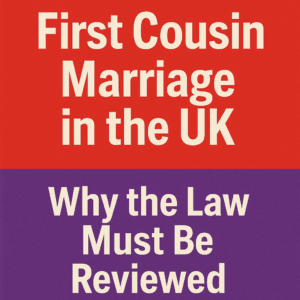 : Why the Law Must Be Reviewed
: Why the Law Must Be Reviewed
 First cousin marriage in the UK has returned to the headlines. The Mail on Sunday reported on the NHS Genomics Education Programme, which described cousin marriage as a cultural practice and even compared it to delayed motherhood. On Monday, the Daily Mail followed up and quoted Aneeta Prem MBE, founder of Freedom Charity, who warned that this is not cultural preservation but a safeguarding risk.
First cousin marriage in the UK has returned to the headlines. The Mail on Sunday reported on the NHS Genomics Education Programme, which described cousin marriage as a cultural practice and even compared it to delayed motherhood. On Monday, the Daily Mail followed up and quoted Aneeta Prem MBE, founder of Freedom Charity, who warned that this is not cultural preservation but a safeguarding risk.
Why the NHS Report Matters
The NHS document framed cousin marriage as a cultural norm and told professionals not to “stigmatise” communities. It even compared it with delayed motherhood. That comparison is misleading. Delaying motherhood is a matter of personal choice. By contrast, cousin marriage, when imposed, is linked to coercion and dishonour abuse.
NHS England later clarified that the page was intended for information only, not as formal guidance. Even so, publishing such material without context weakens safeguards and reduces awareness of the dangers involved.
The Health Evidence
The medical evidence is clear. The Born in Bradford study, which tracked more than 11,000 pregnancies, showed that children of first cousins face double the risk of serious genetic disorders compared with children of unrelated parents.
These conditions include congenital heart defects, thalassaemia, metabolic syndromes, and developmental delays. In addition, NHS figures reveal that in some areas as many as 30 per cent of paediatric genetic referrals involve children of cousin marriages.
The World Health Organisation also recognises consanguinity as a leading cause of preventable inherited disease. Other countries have responded. For example, Norway banned cousin marriage in 2024. China introduced a ban in 1981. In the United States, 24 states prohibit it outright, while others require genetic counselling. By contrast, the UK has no national safeguards.
The Safeguarding Reality
The health risks are only one side of the issue. At Freedom Charity, Aneeta Prem and her team have supported children who were coerced into cousin marriages.
Several girls said they were told they were travelling abroad to attend a wedding. On arrival, they discovered they themselves were the bride. Some were not allowed to return to the UK unless they were pregnant, and were then forced to apply for a spouse visa.
These examples show that cousin marriage can become a tool of dishonour abuse. It strips away education, freedom, and dignity. When imposed on children, it is child abuse.
As Aneeta Prem MBE told the Daily Mail:
“First cousin marriage is not just a cultural tradition – it is a safeguarding risk. At Freedom Charity we have seen how it is tied to dishonour abuse, where young people are pressured from childhood and given little or no real choice. The health evidence is clear. These are preventable harms that place families and the NHS under immense pressure.”
Why Silence Helps No One
Professionals often notice the warning signs. However, many hesitate to act because they fear being labelled racist or culturally insensitive. As a result, children remain unprotected.
This issue is not about race. It is about rights. Every child deserves the best possible start in life. Every young person deserves the freedom to decide if, when, and whom to marry.
What Must Happen Next
Freedom Charity calls for urgent action:
-
A government review of cousin marriage in the UK
-
Recognition of cousin marriage as a safeguarding red flag
-
Political leadership equal to that shown when forced marriage was outlawed in 2014
Genetic counselling and awareness campaigns cannot stop abuse. Therefore, a clear legal framework is essential.
First cousin marriage doubles the risk of serious genetic disorders, fuels dishonour abuse, and denies children their rights. When imposed, it amounts to child abuse.
As Aneeta Prem MBE said to the Daily Mail, the evidence is clear and the harm is preventable. Silence must end. The law must now be reviewed. View other articles on this

